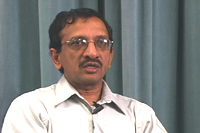Calit2 UCSD Announces Support For New Wireless Research Projects
San Diego, CA, July 10, 2007 -- The UCSD division of the California Institute for Telecommunications and Information Technology (Calit2) has committed more than $1.1 million over three years to support four new research projects in wireless communications technologies. The funds are part of the continuation of the research engagement that Calit2 UCSD has long had with leading telecommunications vendor Ericsson.
|
Five Calit2-affiliated faculty from the Jacobs School of Engineering are the principal investigators (PIs) for five (four new, one ongoing) projects: Bhaskar Rao, Tara Javidi and Rene Cruz are professors in the Electrical and Computer Engineering (ECE) department and Geoff Voelker and Amin Vahdat are professors in the Computer Science and Engineering (CSE) department.
This seed funding will support a half-a-dozen research staff for the projects, as well as two Ericsson engineers who will come to work in a Calit2 lab, a long-time practice which has proven quite successful. The projects are the latest in a series of successful Ericsson-sponsored research projects through Calit2 UCSD.
The researchers will carry out the design and implementation work outlined for each project with the goal of developing fully functional systems or techniques, with significant experience in live deployments. The projects cover a wide range of wireless communications research subjects: shared resources for mobile networks, MIMO SDR (multiple-input multiple-output software-defined radio systems), performance gains in a radio network context, malicious software in the broadband wireless environment and future performance improvements for cellular access networks.
|
The "Resource Allocation for Federated Computing/Communication Environments in Mobile Networks" project will investigate automated techniques for sharing mobile computing and communication resources, especially for the case where autonomous, mutually distrustful organizations are involved. "Put another way, how can two companies share one another's computing and communication resources in a secure, fair, and mutually beneficial manner?" explains PI Amin Vahdat of CSE, "In the context of Ericsson, for example, they are interested in allowing multiple cellular providers to roam across one another's networks, while perhaps leveraging computing, storage and communication at a variety of organizations."
"Calit2's support for the project is critical for development in this important area," notes Vahdat, who is also the director of UCSD's Center for Networked Systems, "As cooperation between different organizations continues to increase, there will be many opportunities to leverage spare computing and communication resources for mutual benefit."
Bhaskar Rao of ECE is the PI for the MIMO SDR Test bed project. "The excitement in this area is that people have shown that the data rate that can be supported when you have MIMO grows linearly with the number of antennas," he says. This added performance comes at no cost to the system: no extra bandwidth, nor extra power, are needed to support high data rates with limited bandwidth, which makes MIMO a very viable option for wireless technologies.
|
However, MIMO is just beginning to appear in commercial systems, so there is not much available in terms of hardware. "So, the goal is to build a test bed wherein we can conduct real experiments to validate some of the theory and claims that analytical results are saying is possible," explains Rao, "Having an environment where you can actually make real measurements and validate new algorithms and new techniques -- this is a very, very exciting opportunity."
Tara Javidi and Rene Cruz are the PIs for the Radio Aware Mesh Network Routing project. "We will investigate the extent of per hop radio diversity gain (such as improved delay, throughput, and power consumption) in a multi-hop radio network context," says Javidi, "and how to make the best use of it."
The initial phase will be a feasibility study, followed by the development of a proposed cross-layer network routing protocol, designed to take full advantage of the diversity gain. A prototype system of the proposed protocol will be built as a proof of concept. "If possible, the prototype will be based on a cross-layer radio platform such as Calit2's CalRadio," explains Javidi.
|
Earlier this spring, Cruz and Geoff Voelker were named Jacobs School Ericsson Distinguished Scholars. Voelker is the PI for a new project, as well as an ongoing one which will be expanded with this support from Calit2.
With respect to the Internet, substantial research to identify and defend against large-scale self-propagating malware, such as worms and viruses, has been conducted. Malware, malicious software, interferes with normal computer functions, and can damage user data and/or send it out to unauthorized parties. However, little work has been done regarding broadband cellular networks, which present new opportunities for malware and new challenges for defense. Voelker's new project, Broadband Wireless Malware, addresses this.
"The overall goal is to develop understanding and defenses against large-scale malware on broadband wireless networks," says CSE's Voelker, "By collaborating with Ericsson, we can combine the existing expertise of the UCSD PIs in malware on the Internet with the domain expertise of Ericsson researchers in broadband wireless networks and handheld capabilities."
|
Voelker will also be expanding his Broadband Wireless Measurements project which currently monitors all of the wireless traffic in the CSE building at UCSD. The current infrastructure consists of over 40 wireless sniffer nodes (which measure the 802.11b/g traffic) and a wired node capturing all the traffic at the wired side of the wireless distribution network.
This existing infrastructure enables the investigation of a number of interesting research questions regarding how the interaction of the TCP/IP protocols and the 802.11 wireless mechanisms influence the end-user perceived performance in a large-scale, production network. Voelker and his colleagues expect that the techniques and the insight gained in this project can be used for monitoring and improving TCP/IP performance in the next generation cellular access networks.
Rao sums up the impact of this funding: "As academics, we tend to be very theoretically oriented. Building a system and getting it to work is a lot of effort and this requires full-time researchers. I don't believe we could have created the MIMO SDR test bed without Calit2's support for bringing in those researchers who will be dedicated to it."
Related Links
Rene Cruz webpage
Tara Javidi webpage
Bhaskar Rao webpage
Amin Vahdat webpage
Geoff Voelker webpage
Ericsson





